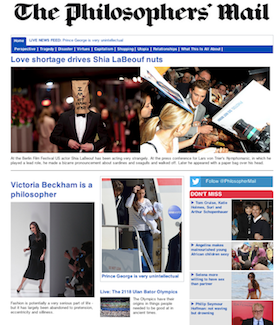There are good reasons for serious people to despair of the news. A minor country singer dies, and the BBC gives him the front page. An actor dies and every channel mourns him as if a president had expired. There’s one final fact that particularly sticks in the throat of serious news people: the most followed news website in the English language, by an enormous factor, is the Mail Online, purveyor of a stream of appalling ‘human interest’ stories of the lowest kind. The clear temptation is to withdraw into the bunker and lament the decadence of a ruined age.
This would be a big mistake. We can face the facts head on: the most attractive, charming, sexy and compelling news outlets enjoy unparalleled influence over the minds of tens of millions of people. But unfortunately, they rarely put out content that might make the world a better place. At the same time, there are lots of serious, earnest, good people attempting to change things, but they put out publications full of very interesting and dense articles that only reach tiny and already-convinced audiences. So the good ideas go nowhere and the not-so-great ideas mesmerise us from every screen. Therefore, the world doesn’t change.

Take education: western education is in crisis; it simply doesn’t match up with the performance of peers in China and Korea. This is going to have major, lasting implications for middle-class wealth in Europe and the US. A few people care a lot but, strangely and shamefully, Taylor Swift’s legs are far more captivating. They are lovely in ways that seem to defy description: somehow they look ordinary, yet perfect. They are long, yet not freakish. They seem unbowed by their implausible length; both utterly firm and yet yielding and soft.
People who take education seriously tend to get apoplectic at this point. They’re not wrong. While delightful, Taylor Swift’s legs are of little significance in comparison with the fate of the western middle class. But getting angry at our fascination with the thighs of a singer is counter-productive in a democracy. We cannot be collectively dragged into being more responsible through guilt. And for a very simple reason. We don’t have to pay attention. If those who care about education are going to get angry, bitter and stern, they’ll just be ignored.
The problem is, we really do need to do something about that education. But the starting point has to be indulgence towards the way our minds work. We are interested in Taylor Swift’s legs not because we are evil, but because we are wired in unhelpful ways. If we are going to be interested en masse in the poor international test scores, we need to take our fragilities on board and therefore get serious, very serious, about trying to make important news not just ‘important’, but also beguiling — almost as tempting to hear about as Taylor’s legs. Then things stand a chance of changing.
This is why I and some colleagues have this week started a new news outlet called, playfully, the Philosophers’ Mail: www.philosophersmail.com. The website looks identical to the ordinary Mail one, many of the stories are similar, but the content is radically different. The goal of the Philosophers’ Mail is to prove a genuinely popular and populist news outlet which at the same time is alive to traditional philosophical virtues. For too long, philosophers (like serious news-people) have been happy merely to be wise and right. This has offered them huge professional satisfaction but it has not influenced the course of society. The average work of philosophy currently reaches 300 people. Hence the challenge that explains the birth of the Philosophers’ Mail, which is rooted in the popular interests, sensibilities and inclinations of the day — but tries to read and caption the news with an eye to traditional central philosophical concerns; for compassion, truth, justice, complexity, calm, empathy and wisdom. The site views the rolling succession of the day’s news as an occasion for the development of insight, generosity and emotional intelligence.
News is not simply information about what is happening in the world. It is one of the key places where we daily shape our underlying assumptions about life — about what is important, admirable, scandalous, normal; where we rehearse attitudes to fear, hope, good and evil. This is why the news should be a major target of concern for real philosophers. The Philosophers’ Mail makes use of popular starting points — the stories a lot of people like to read and talk about already. It is generous to our natural inclinations: to read celebrity gossip, look at erotic images and read shock stories. It is sympathetic (as a starting point) to popular biases: anxiety about whatever feels foreign, a taste for vengeance, lack of empathy for the very poor, envy of the very rich, resentment of the powerful, suspicion of those who seem clever, dislike of awkward truths…
We start by acknowledging that it isn’t strange to be unnerved by a Romanian family begging on a French train; it would be thrilling to have sex with Jennifer Lawrence; one can empathise with the feeling that George Osborne doesn’t quite know what real life is like; it is natural to want to switch off when hearing about trouble in Africa.
We don’t start by asking what the wise or good or serious outlook might be. There are plenty of people pushing such lines already — for that one could turn to the Economist, or the New York Times. The epochal challenge is to reach the people who don’t engage with complex news.
The division between high and low news is at heart a fiction — which breaks down the closer one comes to it. Sophocles, Shakespeare, Tolstoy and Flaubert all took so-called ‘low’ stories and turned them into great art. They were alive to the enduring, serious themes in regular murders and divorces. The problem is not that modern news talks too much about low subjects. It’s that it doesn’t know how to do anything serious with them, it can’t raise them into high ones, the way Sophocles could.
Got something to add? Join the discussion and comment below.
Get 10 issues for just $10
Subscribe to The Spectator Australia today for the next 10 magazine issues, plus full online access, for just $10.
Alain de Botton’s books include Essays in Love and The News: a User’s Manual. www.philosophersmail.com is live now.
You might disagree with half of it, but you’ll enjoy reading all of it. Try your first month for free, then just $2 a week for the remainder of your first year.














Comments
Don't miss out
Join the conversation with other Spectator Australia readers. Subscribe to leave a comment.
SUBSCRIBEAlready a subscriber? Log in